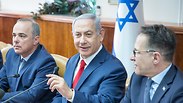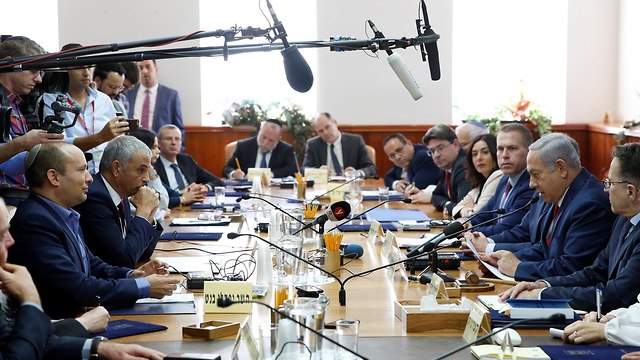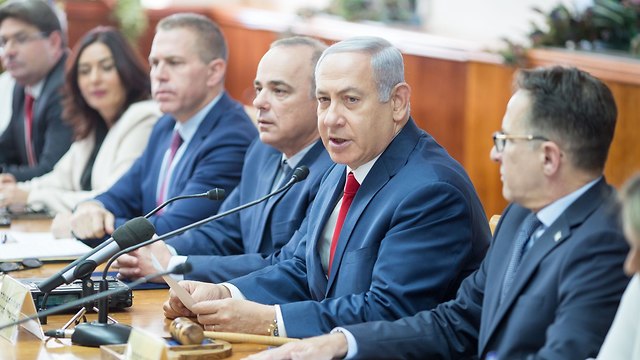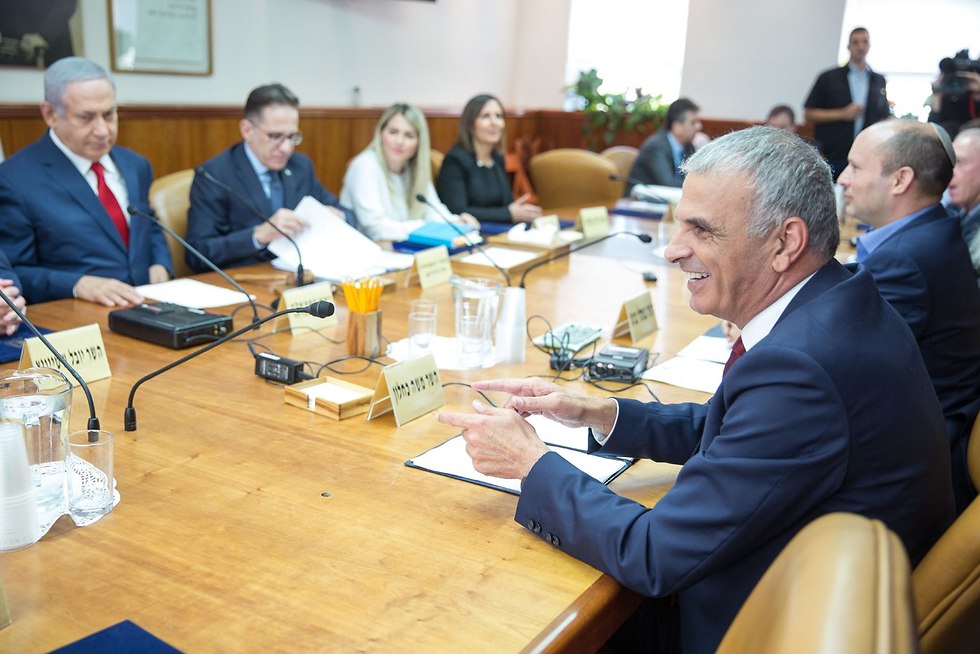
Government meets to vote on budget cuts
Photo: Emil Salman

Government approves NIS 22 billion in budget cuts to ministries
Budget cuts passed despite fierce objection by many of the ministers to cut 1.3% out of each ministry's budget; the cuts will mostly fund additional pay for police officers and prison guards, but also go toward aid for Gaza border communities, additional construction inspectors and hosting the Eurovision.
Widespread budget cuts affecting all ministries were approved by the government on Sunday despite fierce objection by many of the ministers.
The Treasury sought to cut NIS 22 billion ($5.9 billion) from government ministries over the next 20 years (until 2038). Most of the money will fund additional pay for police officers and prison guards, but some of it will also go toward funding aid for the Israeli communities on the Gaza border, hiring additional construction inspectors, and hosting the Eurovision Song Content.
The government discussion on the budget cuts soon deteriorated into a shouting match between the prime minister's chief of staff and the director-general of the Finance Ministry.
While debating whether the Israel Public Broadcasting Corporation (IPBC) should fund the Eurovision out of its existing budget, or whether the Treasury should foot the bill, PMO bureau chief Yoav Horowitz called Finance Ministry director-general Shai Babad "a charlatan, a lying politician who is swindling us."
After the discussion, Babad lamented the fact that "the PMO chief of staff chooses, and not for the first time, to act like a common politician just to make headlines, cursing during the government meeting while talking about things he is hiding the truth about and misleading the government and the prime minister. This behavior does not befit such a senior official in the public sector; this behavior has no place here."
The meeting later broke for recess to allow Prime Minister Benjamin Netanyahu and Finance Minister Moshe Kahlon to hold consultations with senior Treasury officials. An hour later, the meeting reconvened and the government approved a cut of 1.3 percent out of each ministry's budget.
Most of the ministers' objections were over the funding of the Eurovision Song Contest, which is estimated to cost NIS 150 million.
"I, along with Ministers Miri Regev, Uri Ariel and other ministers, opposed to giving additional budgets to the IPBC to produce the Eurovision," Interior Minister Aryeh Deri said. "I opposed it because of the expected mass desecration of the Shabbat, while other ministers opposed it because they believe the IPBC needs to fund the Eurovision's production out of its large budget, without receiving additional funds."
Public Security Minister Gilad Erdan, who supports the overall move to raise the salaries of police officers and prison guards, still came out against the fact his own ministry will see the biggest cuts, since the Israel Police and the Israel Prison Service are both under the jurisdiction of the Public Security Ministry.
Welfare Minister Haim Katz bemoaned the funds that would be lost to his own ministry, telling Erdan, "I won't allow little girls to descend into prostitution for your cops." The cuts would also affect the Welfare Ministry's program to lift families out of the cycle of poverty.
Deputy Health Minister Yaakov Litzman warned the budget cuts "could bring to the destruction of the Israeli health system."
His ministry said the budget cuts could affect plans to reduce overcrowding at ERs, to reduce infection rates, to improve services at NICUs, to cut down waiting times for child development specialists, and more.
"Today the Cabinet approved two important decisions," Prime Minister Netanyahu said following the budget cuts approval.
"The first remedies the lack of tenure and employment security for those serving in the security establishment. This is good news for police officers, police retirees, the Prison Service, the Shin Bet and the Mossad," he explained.
"The second important decision is reserving a budgetary source for aid packages to Sderot and the communities in the area adjacent to the Gaza Strip, as I —as well as the finance and interior ministers—promised at our meeting with the regional council heads last Thursday," Netanyahu added.


















